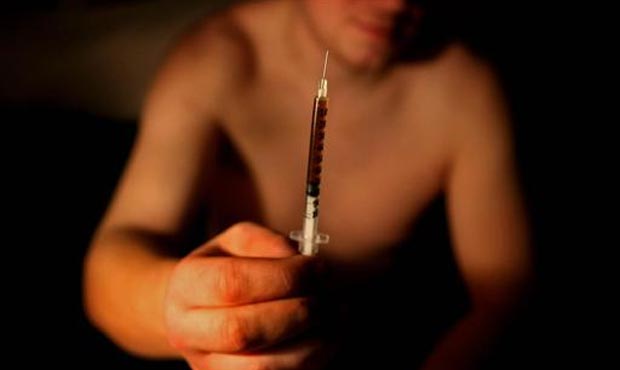Can this drug use survey guide Washington policy?
Jan 19, 2018, 6:12 AM

(AP)
(AP)
Following a new survey of Washington state drug use, a researcher has his fingers crossed that lawmakers in Olympia will start approaching the opioid crisis with methods that work.
“It’s not that we don’t know what to do. We know exactly what to do,” Dr. Caleb Banta-Green told KIRO Radio’s Dave Ross. “What we need to do is implement it in a way that meets the needs of local people and communities in a respectful way that bring all partners together.”
RELATED: Why Vancouver BC is investing in more safe injection sites
Researchers with the University of Washington surveyed people through the state’s syringe exchanges to determine habits, perspectives, and trends among drug users. The result is a 14-page report that is being looked to by Governor Jay Inslee as officials craft policy to fight the current crisis. The report states:
- 78 percent of drug users who primarily use heroin were interested in reducing or stopping their use.
- More drug users are keeping naloxone kits with them — the drug that can be used during an overdose to save a life. Outside of King County, people with naloxone kits went from 24 percent in 2015 to 59 percent in 2017. In King County, the increase went from 47 percent to 66 percent.
- Methamphetamine use is on the rise among people who inject drugs. In 2015, 69 percent of drug users reported injecting meth. In 2017, 82 percent reported injecting the drug.
- 47 percent of methamphetamine users were interested in reducing or stopping their use.
Inslee is now proposing a response to the opioid crisis in Washington. The announcement of this proposal echoes the sentiment that Dr. Banta-Green, a UW researcher, has been promoting for years. For example, Inslee proposes to battle the stigma which blocks access to treatment, and he refers to the problem as a medical disorder. There are now two pieces of legislation working their way through Olympia with these attributes in mind: House Bill 2489 and Senate Bill 6150. They aim to increase the number of people getting treatment by 20 percent annually over the next two years.
Problems around drug use
According to Dr. Banta-Green, there are a series of issue that have held back progress as officials tackle the crisis. He hopes new policy and approaches from the state level will set things straight.
RELATED: How to fix the opioid crisis — “make it easier to get”
Problem: The system is backwards
“What we’ve started doing in the last year or so, particularly in the Seattle area, is rethinking what treatment is,” Dr. Banta-Green said. “That treatment doesn’t have to come with lots of rules and requirements and barriers. In fact, our goal is not to create a perfect person. Our goal is to, first and foremost, keep a person with opioid use disorder on medication every day that we can. The reason for that is because we know that treatment medications support recovery, they help reduce withdrawals and craving. And from a public health perspective, those medications reduce mortality rates by over 50 percent …”
“As they move into more stability in their life, multiple weeks and months into getting stable on medications, then they are at a place that is off the opiate rollercoaster; that they can start taking advantage of healthcare, counseling, and social supports. We have it backward now. We say first you have to stop using or go through all these hoops and counseling appointments, and then we give you this life-saving medication.”
Problem: Interest in treatment depends on access
“There’s some indication that people’s interest in the most effective treatment was higher in places where there is more access to those treatments,” Banta-Green said. “Detox is actually not an effective treatment for the opioid disorder by itself. In fact, it can be counterproductive, and cause relapse and overdose. We saw some more people interested in detox in places that didn’t have access to the more effective services which are medications.”
Problem: Stigma
One of the most common reasons people do not get treatment for opioid use disorder is that people don’t treat it as a medical issue.
“I don’t go to a Starbucks if they treat me mean every time I go there,” Dr. Banta-Green said. “I want to be treated well. We really want to make services that are oriented toward what people actually want. The way our systems are built right now, you would think we don’t want customers. There are all these rules, and barriers and schedules. And these are all huge barriers to people accessing care.”
“And yet we treat people with substance abuse disorders like things are black and white; like they are binary,” he said. “We don’t do that for other health conditions like mental health, obesity, and diabetes. It’s not black-and-white. Life is gray. We are all doing the best we can. The challenge with how a lot of treatment is set up is its abstinence orientation. If you use, you have failed and you can get kicked out of treatment. That is effectively shaming. It is not allowing people to engage.”
Problem: Misconceptions of treatment
“Most people, the vast majority of people, think that drug treatment is inpatient or detox,” Dr. Banta-Green said. “That’s what we’ve heard for alcohol. That’s what’s sold on TV and newspapers. That is not the effective treatment for opiate use disorder. Those can be a part of the treatment that also involves medication and other supports. But alone, those are not treatments for opiate use disorder.”
Problem: People don’t understand opiate use disorder
“Everyone in our state needs to understand some really basic stuff,” Banta-Green said. “Opiate use disorder is a treatable medical condition. That medical condition involves physical dependence on opioids. But it also involves psychological problems. Craving – the most important thing in your life is opiates. It means that socially your life is really difficult. You can’t hold down a job. Your relationships fall apart.”
“If a person is on treatment medication, they are still physically dependent, but they take a medication once a day by mouth as opposed to six times a day by injecting. They are off the opiate roller coaster … on level ground. You can deal with the social components of your life. You can address cravings. In that instance, you are still dependent on opiates, but you are in recovery. And you are reducing your overdose risk by over 50 percent.”
Problem: People don’t know about the Recovery HelplLine
This is a helpline with staff and resources to explain addiction issues, determine a person’s needs and interests, and direct them to treatment as soon as possible. The number is 1-866-789-1511.













